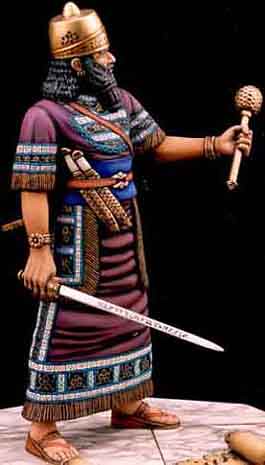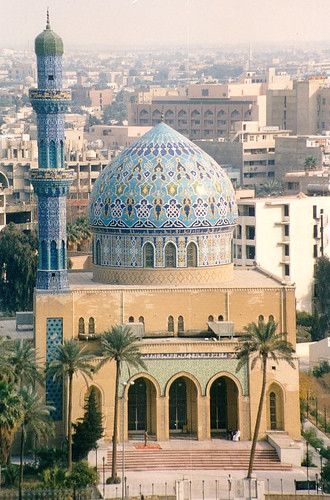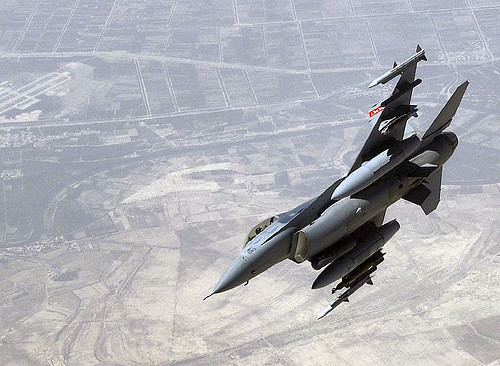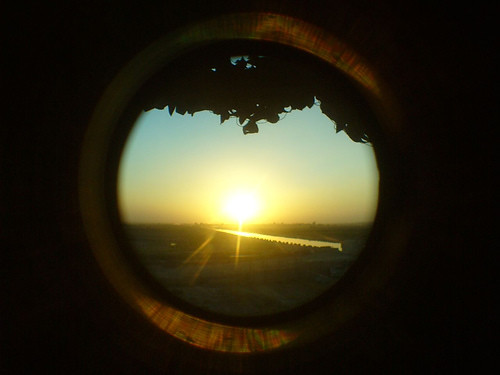The In T View: Bandit 36: Inside The Mind Of An American Officer In The Green Zone

Assyrian King - Photo Appear Courtesy of Christians of Iraq. com
(Update: Bandit's friend Ali, a member of the Iraqi Police and mentioned below, was recently killed.
Bandit has more. We offer our
condolences.)
In this In T View we bring forth the thoughts of an American Officer from inside Iraq's famous Green Zone.
Bandit.three.six is his name and he's a Military Blogger, who can be found at the very fine Bandit.three.six blog, where he discusses events in Iraq, provides you with the latest in B36 News and Video, and brings forth the positive contributions of American Soldiers in the country.
Bandit, 24 years-old, and originally from Alaska, serves as a Site Officer in Charge of Communications, and has a wife and newborn son waiting for him when he returns home. Take it away, Bandit...
MG: When you first received word that you were being deployed to Iraq, what thoughts were running through your mind?
Bandit: I was suprised at first, but not really concerned. I was under the impression that we commo folk didn't deploy much so when I heard that I was it caught me off guard. I knew that thousands of Soldiers had deployed and came home safely before me so I figured that the percentages were on my side.
MG: Once you set forth in Iraq, could you give us your initial impressions of the country?
Bandit: When I first landed in Baghdad I was suprised at how chilled out everything was. I had figured that it was a war zone and everyone would be running everywhere in kevlars and helmets while dodging mortars and rockets. The only reason I knew I was in Baghdad and not Georgia was because someone said, "Welcome to Baghdad."
MG: The Heat! Is Iraq really as hot as everyone makes it out to be?
Bandit: I may not be the best guy to answer this question as I grew up in Alaska (avg winter temp was -80F w/ windchill) so my personal thermometer is somewhat skewed, but the only time I really notice the heat is when I go from inside to outside. After a while outside you get used to the heat and it's no big thing.
MG: You are there in Iraq, away from your family, your home, in a distant land, a different culture - Is the Soldiers life a lonely one?
Bandit: It is, but it doesn't really affect me. I've always been something of a loner and with the internet I can still interact with my family and millions of other people so I'm not too isolated. Plus I'm around other Soldiers all the time so I often wish I could be by myself from time to time. Finding a quite place to be alone is critical over here.
MG: How hard is it to concentrate on your service in Iraq, with a wife and newborn son back in the States? Do you have to be all business when on duty and place personal concerns in the back of your mind?
Bandit: I do my best to keep my personal life seperated from my professional life. I'm lucky to be married to an amazing woman. We have an awesome relationship and she's increadibly emotionally strong. That makes it easier for me to focus on work when I need to which, in turn, allows me to focus on family when I get the opportunity. Also, as a commo guy I'm rarely out of touch so I can talk with her and get pictures of my son. On the rare occasion when I put on my body armor I say a quick prayer that they'll be safe and focus on the mission.

Baghdad mosque by The Poss - Flickr
MG: Most of the Iraqi bloggers, both inside and outside of Iraq, seem to feel the country is in the midst of a Civil War. Just from your perspective, are the Iraqis in a Civil War?
Bandit: I think Civil War is too strong a word for the fighting that's going on right now. PM Maliki kicked off Operation Together Forward to secure Baghdad and what a lot of people don't realize is that to secure an area you will probably have to fight the bad guys who are already there and don't want to move. Pile on to this the terrorists who are fanning the flame of sectarianism and I'd say that we're doing pretty good really. I think most Iraqis are looking for a unified Iraq and recognize that most of the sectarian killing is being perpetrated by outsiders and extremists. The fact that there are people at these markets to get blown up is indicative of that. The people here are remarkably resiliant and determined.
MG: Iraq receives such negative publicity: bombings, killings, unrest, kidnappings, civil strife...It's sort of portrayed as Hell on Earth by the Media. Serving in Iraq, what do you like about the country?
Bandit: The fact that in spite of what the media is portraying, that most Iraqi people continue to do their best to make their country safe. 12.5 million people voted in the last election. That's 75% of available voters. This in spite of the threat of various attacks. And I'm thrilled that I can be a part of helping them build their country!
MG: And conversely, what do you dislike about Iraq?
Bandit: Celebratory gun fire. It goes up, and then it comes back down. Keep your helmet on.

Bathouse Photo appears courtesy of Dave's-Not-Here.net
MG: One thing I'd like to hear about, is your most hair-raising moment in Iraq. What situation occurred that you said afterwards, "Thank God, I survived that!?"
Bandit: I went out to one of the Iraqi ministries a few months ago and while we were there I had to use the bathroom. It was my first time outside the (IZ) and I wasn't sure what was what so I did my best to follow the lead of the guys who did this kind of thing every day. I told my buddy who had already been there a few times that I had to go and he said, "There's a crapper behind the building, I'll wait here for ya." "Ok, cool, I'll be right back," I said as I got out of the truck to find the toilet figuring that finding it by myself was no big deal since he had been here before.
When I got to the gate of the ministry I asked the Iraqi guard where the bathroom was and he pointed behind the ministry building so I started walking back that way. Once I got behind the building I was having trouble finding the bathroom and some guy (no ID/uniform) started talking to me in Arabic. I coulnd't understand him but by his body language I could tell he was trying to figure out what I was looking for. I put my hands to my crotch and motioned like I was unzipping my fly and he realized what I was after. He yelled to a couple kids in Arabic and they motioned for me to follow up some stairs with open doors at every other level. Just to recap, I'm at an Iraqi secured compound, by myself, the first time I've ever been outside a US secured area, and some kid is leading me up some stairs. I had my rifle very close and my eyes wide open.
As I'm walking up the stairs in full gear I pass by some rather startled Iraqi guys and I can tell by the look on their face that they really weren't expecting to see an American at just that moment. I do my best to play it off like everything is cool saying "Salaam," with a smile while raising my right hand from my rifle just long enough to be polite. After a few flights the kids lead me inside and point at a door while pretending to pee signaling to me that this was the bathroom. I opened the door and found myself staring at a hole in the ground which had obviously been used shortly before my arrival.
When in Rome, I figured. I used one foot to keep the door open so I could look over my shoulder and one hand stayed on my rifle while I did my business. When I was done I buttoned up and stepped back out of the stall. The kids instantly presented me with several small hands palm-up while chanting, "money, money, money!?!" After paying the kids off I followed them back downstairs past some different, but no less startled, Iraqi men and made my way back to the trucks. After getting back in my buddy laughs and says, "Sh*t man, I didn't think you'd really go by yourself."
MG: From your own thoughts on the matter, do you feel the American Media is doing a good job of accurately portraying what is happening with you, the American Military in Iraq?
Bandit: No. The good news stories don't get nearly enough play in the media. This is why I've started putting out as much of the good news as I can on my blog. It's not nearly enought to counter the tidal wave of negative media, but it's the best I can do given my resources.
MG: You are in the IZ, aka the Green Zone, the protected enclave that serves as the center of Coalition Forces in the country. Could you give us an idea of what it's like to work in the Green Zone?
Bandit: The going joke is that "we went to war and a garrison broke out." Garrison is the term we use to refer to our home station where the daily focus is on maintenance, paprework and training. Except for the rockets and mortars it's a lot like working a 16 hour-a-day job in back in the States.

Flares Over Baghdad by Trinity TestSite - Flickr
MG: There are those who would argue that the Green Zone isn't the real Iraq, they'd even call it a walled fortress, shut off from the rest of the nation. Obviously, if you were stationed in Mosul or al Anbar, you would have a different perspective of the country and people. Do you ever feel that you're missing out on the real action and flavor of Iraq because you are located in the Green Zone?
Bandit: Yes, I often do feel like I'm not getting a good taste of Iraq. However, if I were in Mosul or somewhere in Anbar I wouldn't have the same visibility of the overall situation throughout Iraq as I do here. Since this is the headquarters area I get to hear about stories from all over, not just my area.
MG: How much interaction do you as an American soldier have with the Iraqis? Do you have a chance to visit them in their homes? Can you make friends with them?
Bandit: I've made friends with several Iraqi policemen and Soldiers. In fact, one of them, Ali, also just had a child. I'm hoping that we can keep in touch so that 15 or 20 years from now when I bring my family out here to show them where I lived for a year we can meet up and properly introduce our kids.
MG: The generousness of the Iraqi People: Iraqis, like many of the Mideast peoples are know for their hospitality. Can you give us an example of Iraqi generosity?
Bandit: When I go to visit Ali he always has a small pot of tea brewing and never fails to offer me some. Even if he's just run out he'll start brewing a new pot and we'll chat while we wait for it to finish.

Eye In The Sky - F16CG Fighting Falcon over Iraq by Echo9er - Flickr
MG: I know there's a camraderie, a fellowship, between members of the same unit, and when there is a loss, you are all affected. I'd like to know how hard does it hit you, when a member of your unit is injured or killed?
Bandit: My unit has been very lucky thus far, the only injury we've had has been someone at another site getting minor wounds from a mortar attack. By the time we found out about it it was already known that her injuries weren't life-threatening so it became just a cool story to tell.
MG: In the end, do you feel that Iraq has been worth your time and effort? And could you tell us why?
Bandit: Yes, without a doubt. I often wish that I could do more to make life better here. When I start getting frusterated and start wondering, "Why am I here?", I think about when my son will be old enough to start asking questions about the war. I can't wait for the day when he asks, "Dad, were you in the war?" That will be a great day for me. And the day my grandchildren ask the same question will be equally as great. The work we're doing over here is so historically significant and I'm right in the middle of it helping out. I've recently been feeling conflicted about going back home, knowing that I won't be here directly helping win the war. If it were possible for me to bring my family here, I would definately consider extending. However, as rewarding and fulfilling as it is to be here, my family is more important to me and since they can't come to me, I'll go to them.

Sundown (Iraq) by TrinityTestSite - Flickr
MG says: Thanks Very Much to Bandit for a very thoughtful In T View.






